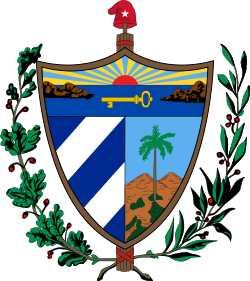 |
|---|
This article lists political parties in Cuba. Cuba is a single-party authoritarian regime, led by the Communist Party of Cuba, where political opposition is not permitted. [1] [2] No party is allowed to campaign or endorse candidates for election, including the Communist Party. Candidates for National Assembly of People's Power elections are nominated by organizations that are firmly controlled by the Party. [3] Candidates are elected on an individual referendum basis without formal party involvement, though elected assemblies predominantly consist of members of the dominant party alongside non-affiliated candidates. [4] Elections in Cuba are neither free, nor democratic. [5] [6] [7] As a result, political rallies by opposition parties occur only sporadically on the island. [8]
Contents
- Current political parties
- Official parties
- Unofficial parties
- Historical parties
- See also
- References
Cuban law also stipulates that it is punishable to receive funds from a foreign government for purposes of a political organization. [9]
